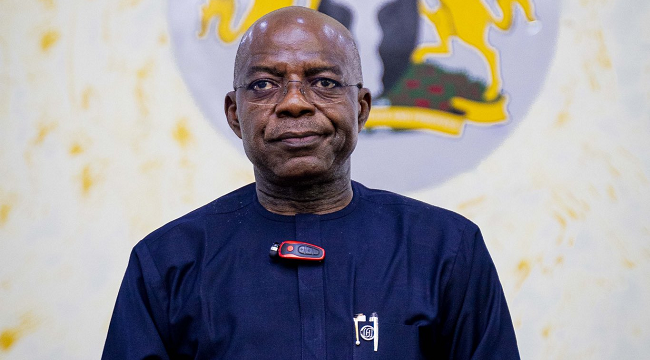Paragraph 1: The Genesis of the Dispute and Otti’s Accusation
The political landscape in Nigeria witnessed a dramatic turn of events as Abia State Governor, Alex Otti, called for the arrest of embattled Labour Party (LP) National Chairman, Julius Abure. This followed a Supreme Court judgment that seemingly removed Abure from his position. Otti accused Abure of impersonation and undermining the authority of the judiciary by continuing to act as the party chairman despite the court ruling. The conflict intensified when Abure announced the "suspension" of Governor Otti from the Labour Party, a move that Otti dismissed as a desperate act by someone clinging to power. This clash set the stage for a power struggle within the LP, raising questions about the party’s leadership and its adherence to legal processes.
Paragraph 2: Otti’s Rebuttal and Call for Abure’s Arrest
Governor Otti, through his Special Adviser on Media and Publicity, Ferdinand Ekeoma, issued a scathing statement condemning Abure’s actions. He characterized Abure and his supporters as "comedians" and "inconsequential irritants" who were attempting to exploit Otti’s name for personal gain. The statement emphasized the Supreme Court’s definitive ruling, which, according to Otti, clearly established that Abure was no longer the legitimate chairman of the Labour Party. Moreover, Otti urged the Inspector General of Police to arrest Abure for impersonation and called on the Independent National Electoral Commission (INEC) to enforce the Supreme Court’s judgment to uphold the rule of law and safeguard Nigeria’s democracy.
Paragraph 3: The Supreme Court Ruling and the Caretaker Committee
The core of the dispute centers around the Supreme Court’s ruling, which affirmed the establishment of a National Caretaker Committee led by Senator Nenadi Usman. According to Ekeoma, this ruling effectively stripped Abure of all authority to act on behalf of the Labour Party. He alleged that Abure’s announcement of Otti’s suspension was a direct response to being summoned by the Caretaker Committee to address serious allegations of misconduct, including financial impropriety, impersonation, and anti-party activities. The timing of the suspension, just hours after the summons, suggested a retaliatory motive, further complicating the intra-party conflict.
Paragraph 4: INEC’s Clarification and the Status of Party Leadership
Amidst the confusion and conflicting reports, INEC intervened to clarify its position on the leadership of both the Labour Party and the Peoples Democratic Party (PDP). INEC refuted media reports suggesting it had recognized Abure as the LP Chairman and Senator Samuel Anyanwu as the PDP National Secretary. The electoral body stated that these were false and misleading reports and that they had not officially recognized any individual in the ongoing leadership disputes within either party. Rotimi Oyekanmi, Chief Press Secretary to the INEC Chairman, explained that Abure’s name and that of LP National Secretary Umar Ibrahim remained on the INEC website due to a previous court order, not in recognition of his current claim to leadership.
Paragraph 5: The Timeline of Legal Proceedings and INEC’s Response
The legal battle surrounding the Labour Party leadership took a decisive turn on April 4, 2025, when the Supreme Court overturned a Court of Appeal ruling that had previously recognized Abure as the chairman. The apex court clarified that the Court of Appeal lacked jurisdiction in matters of internal party affairs, paving the way for the formation of the Caretaker Committee. Following this ruling, a delegation led by Governor Otti presented a certified copy of the Supreme Court judgment to INEC, urging the electoral body to implement the decision promptly. Similarly, the Supreme Court had earlier addressed a leadership dispute within the PDP, affirming Senator Samuel Anyanwu’s position and emphasizing the principle of non-interference in internal party matters.
Paragraph 6: INEC’s Commitment to Due Process and Future Actions
INEC reiterated its commitment to adhering to due process in resolving the leadership crises within the affected political parties. The electoral body acknowledged the complexity of the situation and stated that it was carefully reviewing the implications of the Supreme Court judgment before making its official stance known. This cautious approach underscores the significance of upholding the rule of law and ensuring that any decisions taken are in full compliance with legal precedents and the principles of internal party autonomy. The unfolding events highlight the delicate balance between judicial oversight and the internal governance of political parties in Nigeria’s democratic landscape.


